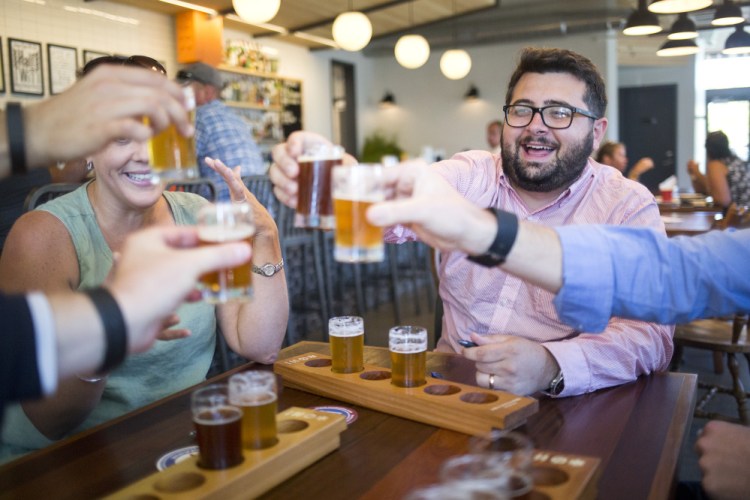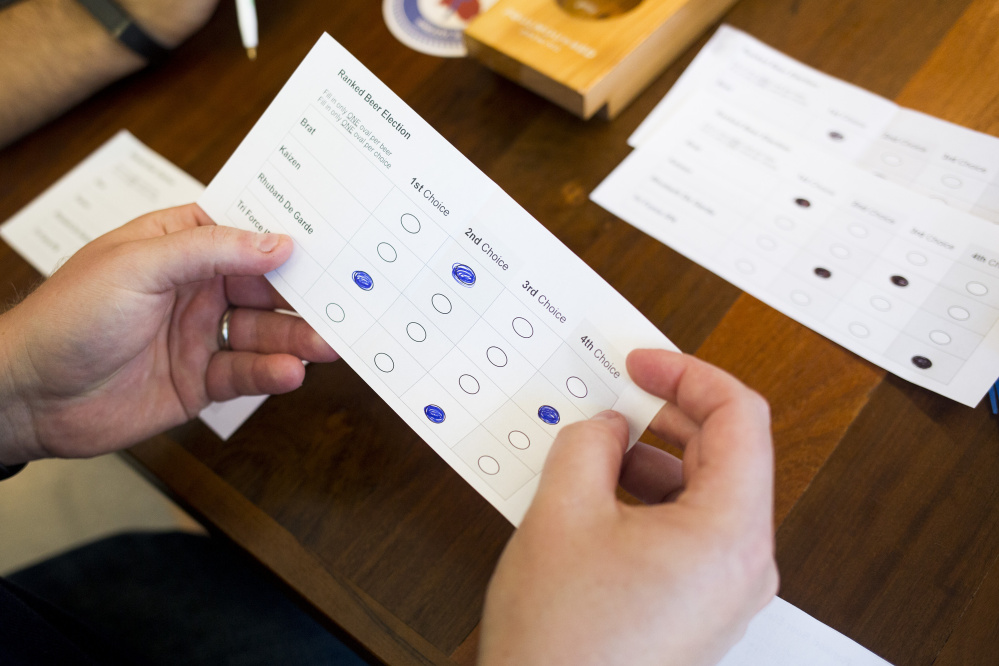AUGUSTA — Maine voters will have the chance on Nov. 8 to become the first in the nation to adopt a ranked-choice voting system to elect members of Congress, the Legislature and the governor.
Supporters have raised $600,000 to spread their message that a ranked-choice voting system, which comes into play when more than two candidates are running for an office, will lead to more civil campaigns that favor moderate candidates.
Critics, including Gov. Paul LePage, have lambasted the proposal, saying it violates the Maine Constitution, which calls for winners of an election to be chosen by a plurality of the vote.
But there is no organized opposition campaigning against the measure, which appears as Question 5 on the ballot, and the biggest obstacle to approval may be voter ignorance or confusion about how the system works.
A Maine Sunday Telegram poll conducted by the University of New Hampshire Survey Center in September found that 48 percent would support the change, 29 percent were opposed and 23 percent were undecided on the question. The poll also found that 61 percent of Democrats support the change, compared to 45 percent of unenrolled voters and 35 percent of Republicans.
The percent of undecided voters shows that the concept of ranking candidates may not be well understood. And as Maine would be the first state in the nation to move to a statewide ranked-choice system, voters may also be hesitant.
“I just don’t see the benefit; even if you got your second choice you are still going to complain, you may end up in the same place and it may turn out to just be this artificial process to show consensus when there really may not be any,” said Kimberly Grose, 58, of Bath.
Other voters, like James Cochrane of Acton, put it more simply.
“It just sounds convoluted,” Cochrane said.
The present system, in which the candidate with the most votes wins, is how LePage first won office in 2010 with 37.6 percent of the vote, about 10,000 more votes than second-place finisher, independent Eliot Cutler, who supports the proposal.
LePage’s unpopularity among liberals and moderates has been a driving force for those who say candidates should be selected by more than a simple plurality of votes.
With more than two candidates on the ballot in both 2010 and 2014, LePage’s successes have been largely dependent on splitting the vote between Democrats and independents. Supporters of the ballot question say it’s much harder for that to happen with ranked-choice voting.
Under ranked-choice voting, voters rank candidates in order of preference. If no candidate gets more than 50 percent of the top votes cast after the first tally, the candidate with the fewest votes is eliminated. Voters who chose the eliminated candidate have their ballots added to the totals of their second-ranked candidate and the ballots are retabulated. This process continues until one candidate has a majority of votes and is declared the winner.
Supporters can point to cities, like Portland, which has used ranked-choice voting since 2011 for its mayoral races, for an example of how it works. A number of other cities around the country have also implemented a ranked-choice system, and several states use the system for overseas absentee ballots of military members or citizens working abroad.
The political action committee supporting the ballot question, the Committee for Ranked Choice Voting, has collected nearly $600,000 in donations in support of the measure. Much of that money has come from small donors around Maine but the committee has also benefited from larger infusions of cash from out of state, including a $78,000 donation from Fair Vote, a Washington state nonprofit that advocates for ranked-choice voting across the country. The group has also dispatched somewhat high-profile advocates, like former Nirvana bassist Krist Novoselic, to Maine to stump for the measure.
Supporters in Maine have also held ranked-choice voting demonstrations in the form of beer tastings at local brew pubs around the state as a way of showing people how the system works.
Kyle Bailey, the campaign manager of the committee, said those efforts have been largely successful, with voters coming away with a better understanding of the process.
The Maine Republican Party has remained neutral on ranked-choice voting. Members of the Maine Democratic Party voted to include a plank in the party’s 2016 platform supporting election reforms – including ranked-choice voting. But the party’s state committee, including its leading officers, have remained neutral, party spokeswoman Katie Baker said.
LePage has said changing Maine’s voting system by a vote of the people would be unconstitutional and the change, if approved, would likely be challenged in the courts and overturned. In an appearance on WGAN radio last week, LePage said he wasn’t necessarily opposed to changing the voting system in Maine but said the committee was going about it the wrong way.
“Change the constitution, if you want to change it,” LePage said. He points out Maine’s constitution states candidates shall be elected by a “plurality” of votes.
Another opponent is Sen. Bill Diamond, D-Windham, who also served eight years as Maine secretary of state, the state’s top election official. He said he believes ranked-choice voting is going to be difficult to implement given the range of small and large voting operations that take place in municipalities around Maine.
Diamond said the proposal will also be far more costly to implement than what supporters are suggesting.
“In order to prevent a lot of chaos there is going to have to be a lot of high technology brought to these various places and in some cases it is going to be very expensive – we still have some towns that still use just paper ballots,” Diamond said.
But the current secretary of state, Matt Dunlap, said Maine’s constitution allows laws to be changed by a vote of the people in a statewide referendum or by the legislative process.
Dunlap said on its face ranked-choice voting is not necessarily unconstitutional.
“It’s a matter of opinion,” Dunlap said. “Formally, everything considered and passed either by the people directly or through their representatives in the Legislature is considered to be constitutional unless and until challenged successfully before the Law Court. The folks in the black robes have final say on constitutionality.”
Supporters of the ballot question said they believe a previous state supreme court decision in Massachusetts and a federal circuit court decision in California puts them on solid legal footing.
Bailey, the spokesman for the supporting campaign, called the unconstitutional assertions “red herrings.”
He said Mainers, like many voters across the country, are fed up with gridlock and polarization of American politics and they want change. Many see changing the voting system to one that ranks candidates as a way to pull political conversations back to the center, where most voters reside in the first place. While their numbers have declined in 2016, the largest single block of Maine voters is unenrolled and does not belong to any of the state’s four official parties – Democrats, Republicans, Greens and Libertarians.
Bailey said the committee recently launched its first round of 30-second television ads, which target the sentiment of a polarized system and the frequently heard rationale that voters, especially in the 2016 presidential election, are being forced to pick the lesser of two evils instead of the candidate they actually like the best.
In one television spot a voter appears with a clothespin on his nose. Others are shown exiting the voting booth holding their noses or making faces of displeasure. The narrator asks: “Did you ever hold your nose to vote for the lesser of two evils just to keep a candidate you really despised from winning?”
Or as Bailey puts it: “Is status quo politics working for you or do you want to have more voice and more choice in your elections?”
Send questions/comments to the editors.






Comments are no longer available on this story